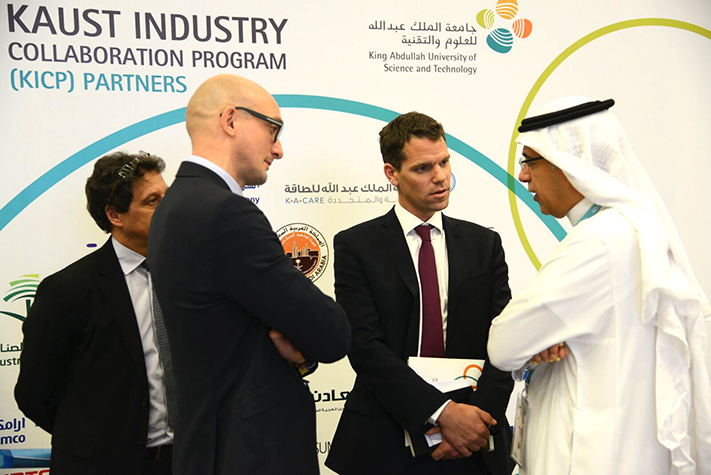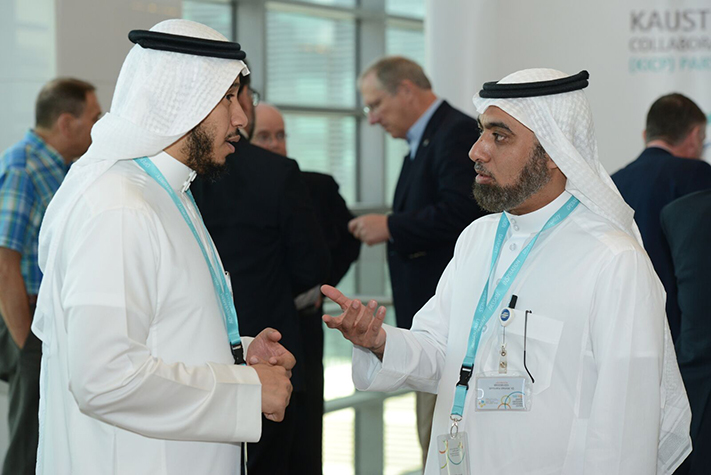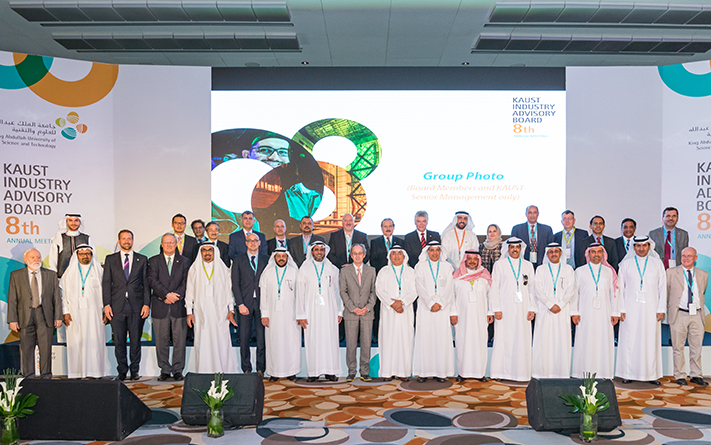The KAUST Industry Advisory Board (KIAB), consisting of executive-level representatives from industry, met on the KAUST campus on March 1 and 2 to discuss the latest research activities at the University and how these align with industry needs.
The KAUST Industry Advisory Board (KIAB) meeting, an annual signature meeting that puts the University’s research, education and economic development activities in front of the eyes of industry, took place on March 1 and 2 on the University’s campus. Over the last eight years, KIAB has served as a major platform for identifying avenues of collaboration with and between members of the
KAUST Industry Collaboration Program (KICP).
KIAB, which is chaired by
KAUST President Jean-Lou Chameau, consists of a board of executive-level industry representatives that convenes to discuss the latest research activities at KAUST. The meeting provides an opportunity for KICP members to provide guidance and recommendations on research topics relevant to industry needs. Members include Saudi and international organizations and corporations with a focus on advancing research and development in the Kingdom.
The 2017 meeting featured a number of unique speakers, presentation sessions and group panel discussions from both industry and academia, with KAUST welcoming the Saudi National Water Company (NWC) as the newest KICP member at the table.

The KAUST Industry Advisory Board (KIAB), consisting of executive-level representatives from industry, met on the KAUST campus on March 1 and 2 to discuss the latest research activities at the University and how these align with industry needs.
Emphasizing the importance of innovation
Echoing throughout the 2017 meeting was the importance of technology in a changing world. KIAB opening keynote speaker Mutlaq Al-Morished, CEO of the National Industrialization Company (
TASNEE), outlined the development and growth of the chemical industry in Saudi Arabia and the steps industry in the Kingdom must take to remain resilient.
“When the environment changes, companies need to change,” said Al-Morished. “The chemical industry lives and dies by technology. As we see more changes in technology and innovation, we must not shy away from asking hard questions and we must not be risk-adverse. We must encourage open-mindedness and think outside of the box.”
Dr. Abdulrahman Al-Ibrahim, CEO of the NWC, discussed establishing sustainable value through strong partnerships and the challenges of change and growth in the future in his keynote address.
“The use of technology in the water sector has been overlooked,” he said. “There is great room where we can participate and use technology as much as possible. Technology is basically a tool, and we need to build more human capital to allow for more sustainable operations in the Kingdom.”
Science meets business
The work of KAUST Professors
Mark Tester,
Gilles Lubineau,
Wolfgang Heidrich and
Matthew McCabe made up the KAUST research highlights shared during the 2017 meeting. In their presentation sessions and in a panel discussion, the professors emphasized the need for both academia and industry to be open-minded and welcome to change as they talked about their research activities.
Tester’s work at KAUST centers on growing
salt-tolerant plants using brackish water or partially desalinized seawater and
discovering the genes that allow certain crop plants to grow in difficult environments.
“We need to generate a new type of agriculture for the next 40 years when we are going to require an increase in food production,” said Tester. “Presently one-third of global food production is produced under irrigation, and about 70 percent of the world’s water is used in agriculture. Although there is a lot of water out there, most of it is salty or brackish, presenting a challenge for food production.”
Developing human capital
KIAB speaker
Dr. Najah Ashry, vice president of the University’s
Saudi Affairs, noted KAUST prides itself on the quality of its graduates, who are highly sought after internationally and locally—but added that the quality of
students attracted to attend KAUST also plays a major role in this.
Her presentation highlighted the KAUST-supported government initiatives and the KAUST-led initiatives that focus on nurturing talent from Saudi Arabia. In particular, the
KAUST Gifted Student Program (KGSP) prepares and supports a select number of Saudi high school students for science-related undergraduate degrees before they continue their studies at KAUST at the graduate level. Three students from this program have recently graduated from the University with
Ph.D. degrees.
“At KAUST, we look into the holistic development of students, and we want to make sure our students are critical and global thinkers. We focus on how we can best develop our talent, as we know that there is much KAUST can offer in terms of talent development and talent-matching. This is evident through our approximately
330 graduates who are now working in-Kingdom,” Ashry said.

The KAUST Industry Advisory Board (KIAB), consisting of executive-level representatives from industry, met on the KAUST campus on March 1 and 2 to discuss the latest research activities at the University and how these align with industry needs.
Bringing people together
Bridging the gap between industry and research is essential in addressing global challenges. KAUST recognizes this as an important step in fulfilling its mission and provides many opportunities for industry engagement.
“At KAUST, we provide several platforms to encourage industry and academia partnerships in finding common solutions to problems faced in an ever-changing world,” said
Tristan Walker, KAUST vice president of
Innovation and Economic Development. “Whether it is through sponsored research agreements or utilizing our
laboratories, office spaces or pilot testing and scale-up facilities, KAUST works with industry partners to problem-solve and accomplish their goals for growth in the region.”
To learn more about KIAB and the KAUST Industry Collaboration Program (KICP)
Click here.
Related stories




